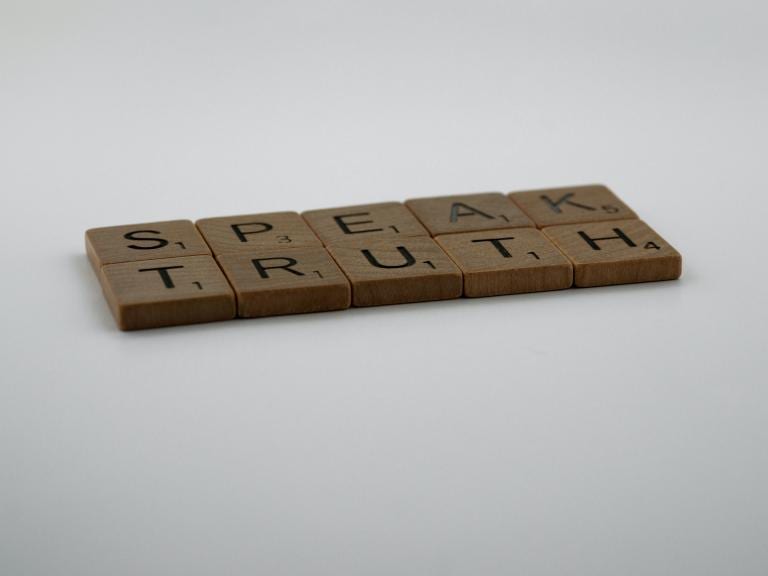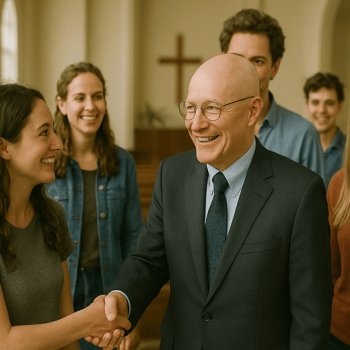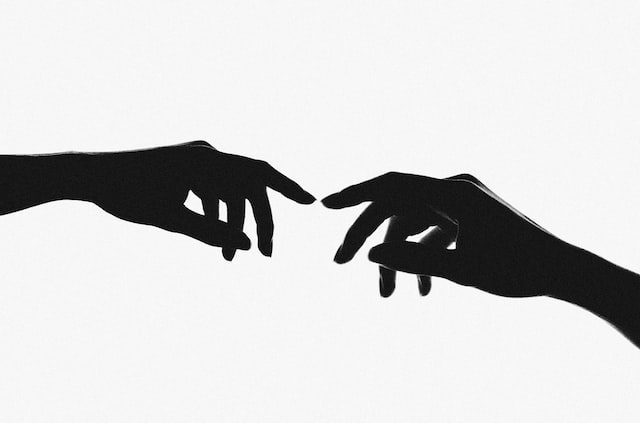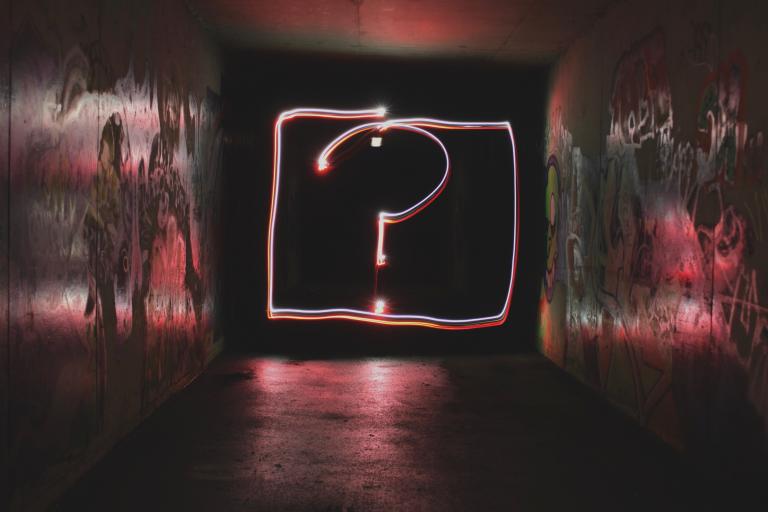
If you believed that everyone was infectious and could potentially spread a deadly disease to you, you might avoid talking to anyone, altogether. You may stay inside, isolated, and excluded from the outside world. You may panic at the thought of someone stopping by unannounced. And you’d stay locked in a bubble, finding a way to avoid people, conversation, and connection. You’d probably then turn to some virtual reality system and filter yourself into a world that is safe from disease.
Staying safe inside a bubble has its benefits. It lowers your risk for infectious disease. It lowers your risk for accidental personal injury. It reduces the chance of relationship failure. It lowers your chances of being hurt or humiliated. I lived in a bubble for quite some time. I speak from experience. There are amazing benefits.
But there are also unfortunate consequences of living in a bubble. You miss out on the connection. Real connection, not WIFI. When you displace yourself from a bubble, you are given opportunity after opportunity to share space with another human being. No avatar, no bio, no emoji reacts, no blocking. You are given the gift of presence with people. And although it’s definitely anxiety-provoking in the beginning, it turns into something more extraordinary after that. A connection can lead to love.
In the last 2 years, however, the world has been plagued by the debilitating effects of lockdowns, social distancing, and masked encounters. Essentially, isolation and disconnection have been impacting a great majority of us, and the impact of these “healthcare” measures is mounting.
Dr. Mattias Desmet shared his concern back in February 2020 about what happens when we live in isolated bubbles. Rather, how quarantine and exclusion from society impact us, collectively and individually. He noted that between the overestimation of the danger of the virus combined with the social panic of individuals, what develops is called mass psychosis formation. Desmet speculated that the harm caused by isolation and starvation would be far greater than the disease itself. Aspects of reality would be disrupted.
Mattias lists 4 conditions that occur which lead to mass psychosis formation. The first condition is the lack of social bonds, a lack of connectedness. Maybe you will recall many reports (all over the world) indicating concerns about isolation and loneliness. Here in the US, the phrase “loneliness epidemic” was coined in 2020. When we are disconnected from others and when we fear close proximity to others, we all suffer greatly. Connectedness is important for mental health.
The 2nd condition Mattias describes is the lack of meaning-making. This follows loneliness wherein a lack of meaningful relationships and connections erodes purpose and sense of life. Mattias references a worldwide Gallup poll that indicated only 13% of the population experience meaning through their jobs, whereas 67% of the population found their job to be meaningless. A lack of meaning-making stems from itself in all our activities. If you’ve been on TikTok for the last 2 years, you’d notice many, many, many individuals (especially stay-at-home parents) are struggling to make each day meaningful and purposeful. Without a connection to purpose, either through people or a job, nothing makes sense about the world, and confusion sets in.
The 3rd condition Dr. Mattias describes is followed by high levels of free-flowing anxiety which is disconnected from mental representation. Mattias notes that when people are aware of their anxiety, they know how to control it or avoid it. We move away from our object of anxiety. He notes that this is a most aversive mental state as with so much free-flowing anxiety, we cannot run away from it. Mainly because we are unsure of what is causing it. This leads to demoralization, a disconnect between the symbolic and the real. We struggle to make sense of our world, but also our thoughts.
The 4th condition follows the first 3 and ultimately leads to free-flowing aggression and frustration. Isolation leads to frustration. This would seem obvious but for many, it is a hidden result of anxiety and disconnectedness. Again, this has to do with our confusion and inability to make sense of the world. With conflicting information, divisive discussions, and threats over bodily autonomy and freedom of choice, many people are put into a stage of aggression and that can lead to outbursts and more conflict.
Dr. Mattias notes that something happens during these conditions that offer a way to combat the confusion, frustration, and isolation; a strategy to solve the crisis. We place our focus on an object of anxiety. Take, for instance, the virus. We recognize that the source is the virus and so we form new social bonds, through solidarity, to combat the problem. People then demonstrate their willingness to participate in the resolution by doing what the others are doing. One example of this is getting the vaccine and then informing all the people you know about your decision. Here, you have decided that the virus is the object of anxiety and therefore you must protect yourself from that object.
Others form solidarity over the decision not to try the experimental gene therapies. They form social bonds over their unwillingness to comply. This group decides the object of anxiety is the government and mandates, big Pharma, and their desire for profits, and “sheeple” that continue to comply.
Unfortunately, as Mattias points out, the solutions that stand to generate the highest absurdities end up being the prevailing narratives. For about 30% of the population, the more absurd the measures are, the better the measures will work (in their minds). The reason behind this is that these absurdities become rituals. By participating in these measures, they feel a ritualistic bond with their society. These become the acceptable behaviors of society.
The thing about rituals, however, is that there always follows a sacrifice. And if you have been paying attention to the world around you, you will notice that the great sacrifice an individual can make, on behalf of the collective, that is, is to line up for a jab in the arm—despite the fact that these are not pragmatic advantages at all. The overarching theme of this solidarity is that the collective is more important than the individual. More than that, many are sacrificing their own children.
Once all 4 conditions have been met, the field of awareness narrows. People will only see what the narrative indicates. This is typical for those who are under hypnosis, Dr. Desmet points out. They are only aware of the part of reality that is cognitively and emotionally indicated by the hypnotizing or mass narrative. Intelligence does not play a factor. The effects of hypnotism impact a wide and diverse spectrum of people. They become convinced that their ritualistic sacrifice is their duty to the greater good. They become hyper-focused on the COVID death toll, the new outbreak numbers, whether someone else is wearing a mask or got the jab. They are only concerned with the general narrative. And that general narrative operates on the fear frequency only.
Some people are not so easily swayed. There is an optimistic chunk of the population who do not fall for the hypnosis or recover from the illusion very quickly. You know who you are.
There is hope, however. There are ways to help wake others up. Keep speaking out. Keep asking questions. Continue to seek the truth. Don’t let the status quo ideologies hold you back. You can only impact change one conversation at a time. Communication is so very important when seeking truth. Truth is meant to be shared, never forced.
Dr. Desmet says the best strategy is always nonviolent resistance. This includes nonviolent communication. Don’t perpetuate the violence of the system that you oppose. Awareness is the first line of defense. Pay attention to the symbology of the way information is communicated to you. Is there nudging or leading in the headline? Are the words you are reading cleverly placed to inspire reactivity?
Bonds have been broken in society. People are yearning for connection but are also scared and unsure about their future. If you are a truth seeker and you want to help someone, be humble and compassionate. Try to do it through a face-to-face conversation. Don’t make assumptions. Be intentional with your words. Don’t take their views personally. Be skeptical but learn to listen (as Don Miguel Ruiz would say).
What makes humans phenomenal is that we utilize speech to form social bonds. Conversation leads to connection. Speech is under attack. Truth-seeking is under attack. When speech is under attack, this means that the process for making social bonds is also under attack. Ask yourself, why would any system facilitate a model of behavior that explicitly prevents speech from taking place if it doesn’t fit the narrative? Why would any system aim to break our social bonds? Why would a system aim to disconnect us? Is it because when we are united, no one can stop us? Is it because once we know we are all One, we will find no more cause to justify the great military complex? If we have peace, who will fund the wars?
To hear Dr. Mattias Desmet, click here.
















